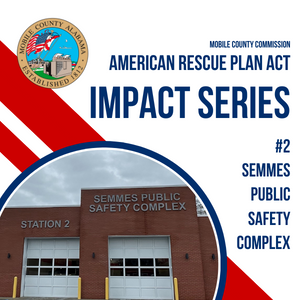American Rescue Plan Act Impact Series 1: Journey to Recovery
Posted on: Feb 8th, 2024 | COVID-19News and Announcementsfeatured news

This is the first in a series of articles about Mobile County Commission’s local investments of ARPA funds.
In the first quarter of 2024, a time considered post-pandemic, the Mobile County Commission has allocated about 92% of its American Rescue Plan Act (ARPA) dollars.
Mobile County will be spotlighting ARPA-funded projects and collaborating organizations. Below is a recap of the process.
March 2020 began a new wave of uncharted waters, altering life in Mobile County and across the globe. Limitations of direct contact with people, restrictions on movement and travel, changes in work and school, and uncertainty about the future were created by the rise of the coronavirus and the COVID-19 pandemic.
“COVID-19 brought new challenges to our community. Our focus was keeping our county residents and employees safe, keeping our services going, and making sure the latest information was in reach to make our next informed decision. Daily, we moved the County forward through something none of us had ever experienced,” said Commission President Randall Dueitt, who represents District 3.
One year later, President Biden signed into law the American Rescue Plan Act (ARPA), setting aside a total of $1.9 trillion in federal funding for COVID-19-related expenses, needs, and recovery. Of the federal funding, $350 billion was designated for state, local, and tribal governments under the State and Local Fiscal Recovery Fund ("SLFRF").
Mobile County Commission was awarded $80.26 million in ARPA/SLFRF funding. The award has specific guidelines including the requirement that recovery fund dollars be obligated by December 31, 2024, and fully expended by December 31, 2026.
“This is a once-in-a-generation opportunity and we felt it important to use the time we’re allotted to distribute these ARPA funds because they allow us to make transformational investments to meet needs that could not have been addressed otherwise,” said District 1 Commissioner Merceria Ludgood.
After months of research and preparation for the task of allocating these resources, Mobile County Commission’s Strategic Spending Plan, was approved in August 2022 and revised in January 2023. It is the planning tool that directs Mobile County’s ARPA funds to address the negative effects of the COVID-19 pandemic. The Strategic Spending Plan explains the Mobile County Commission’s process: understanding priorities, identifying recovery goals, identifying vulnerable populations, public outreach, a spending strategy, strong accountability through monitoring and compliance, the development of a flexible process, as well as both reporting and closeout. It also explains the Mobile County Commission’s five strategic priorities:
- Provide direct response to the public health crisis.
Some examples: Cardiac arrest units for Mobile County EMS, Capacity enhancements for volunteer fire departments, Capacity enhancements for mental health/behavioral programs at Altapointe, Franklin Primary Health, Lifelines Counseling, and Veterans Recovery Resources, Software for Mobile County hospitals, and equipment for USA Health.
- Strengthen local government operations.
Some examples: District Attorney's backlog of cases, Court technology, software for finance, HR and cybersecurity.
- Improve public facilities and infrastructure.
Some examples include: Mobile County Escatawpa area water storage tank and water main, Mount Vernon water treatment upgrades, new water supply well for Kushla Water, new Celeste Road water main for Turnerville Water and Fire Department, Semmes Public Safety Complex, and an outdoor pocket park in downtown Mobile.
- Provide aid to the most vulnerable populations.
Some examples include: Disability transportation for Mount Vernon Senior Center, affordable housing through Habitat for Humanity, Restore Mobile and Africatown Redevelopment Corp., Direct assistance for those impacted by COVID-19 with Sickle Cell Disease and within the MOWA Band of Choctaw Indians, Workforce/Education/Leadership programs through Boys & Girls Clubs of South Alabama, Mobile Area Black Chamber of Commerce, Community Corrections, Mobile Area Interfaith Conference, 100 Black Men, Vivian's Door, and Boy Scouts of America.
- Increase economic recovery and growth efforts.
Some examples include: Master Plan for Mobile's Civil Rights & Cultural Heritage District, Friends of the African American Heritage Trail, Mobile Sports Authority, and the USS Alabama.
“Our goal is to find the highest and best use of the ARPA funds. As we continue to respond to the impacts of the COVID-19 pandemic, we will also invest in initiatives that support our vulnerable populations and strengthen our communities through economic recovery. Our planning process helps us to ensure we are meeting the needs in Mobile County through collaborative efforts,” said District 2 Commissioner Connie Hudson.
As a federal grant program, the funding process is complex, and the approved projects are in various stages of completion. The table below indicates Mobile County Commission allocations of its ARPA dollars through January 2021.
Want to know more? Updates on Mobile County Commission’s ARPA allocation are available at https://www.mobilecountyal.gov/american-rescue-plan-act-of-2021/.
CLICK HERE to view Mobile County Commission ARPA allocations through Jan. 31, 2024.